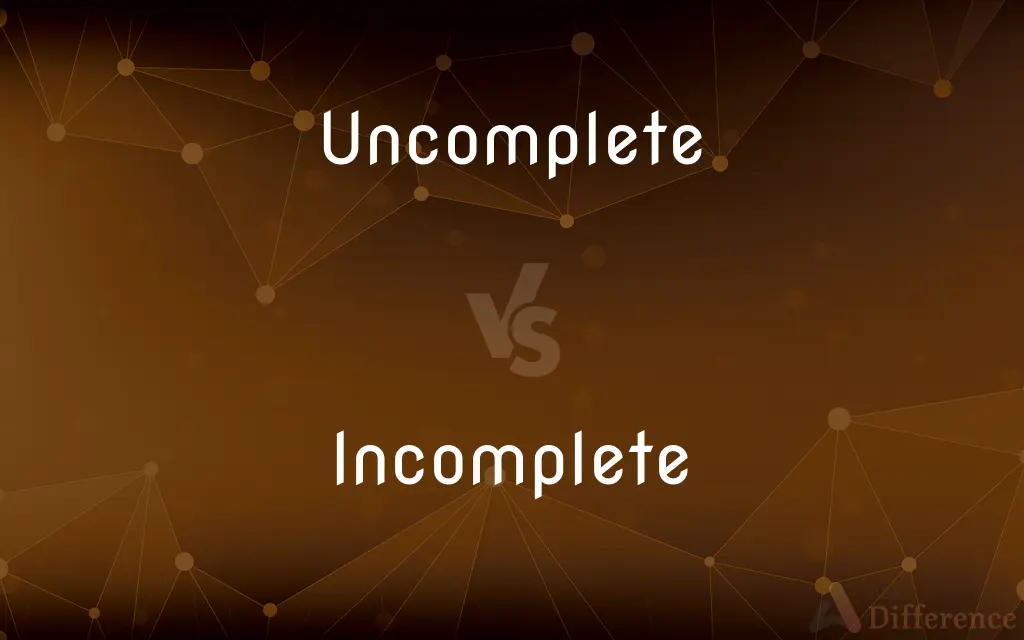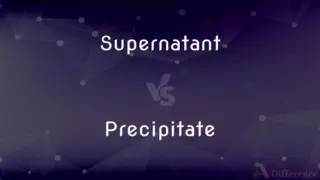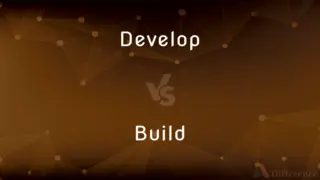Uncomplete vs. Incomplete — What's the Difference?
Edited by Tayyaba Rehman — By Urooj Arif — Updated on April 3, 2024
Uncomplete emphasizes the process of undoing completion, whereas incomplete denotes something never finished.

Difference Between Uncomplete and Incomplete
Table of Contents
ADVERTISEMENT
Key Differences
Uncomplete suggests that something was once complete but has since been reverted to an unfinished state. It's a less common term, typically used in contexts where the completion of something is actively reversed or undone. Whereas incomplete describes a state of not being fully made, done, or accomplished, indicating that something is lacking or missing from being whole or finished, without implying that it was once complete.
In usage, "uncomplete" might be applied in specific or technical contexts, such as in art, where a piece is deliberately deconstructed after being finished, or in data, where completed entries are reverted to a prior state. On the other hand, "incomplete" is widely used across various contexts, from everyday language to academic and professional settings, to denote work that is unfinished or lacking some necessary component.
The prefix "un-" in "uncomplete" suggests an action of reversal, indicating a move away from a state of completion. This nuances it differently from "incomplete," which is marked by the prefix "in-," denoting a negation or absence of completion without the implication of reversal or undoing.
While "uncomplete" focuses on the process or action that takes something from a state of completion back to incompleteness, "incomplete" simply describes the current state of something without fully addressing how it arrived there. This difference highlights the dynamic versus static nature of the terms, with "uncomplete" suggesting change and "incomplete" describing a condition.
Considering these distinctions is important not just for understanding the terms themselves but also for their application in various fields. While "uncomplete" might see use in artistic or philosophical discussions to describe a deliberate process, "incomplete" is more universally applicable, from describing incomplete assignments to unfinished projects or processes in virtually any field.
ADVERTISEMENT
Comparison Chart
Definition
Something reverted to an unfinished state.
Something not fully made, done, or accomplished.
Usage Context
More specific or technical, suggests reversal.
Widely used, denotes a lack of completion.
Connotation
Implies an action or process of undoing completion.
Indicates a state of being without necessary components.
Prefix
"Un-" suggests reversal or undoing.
"In-" indicates negation or absence.
Focus
On the process or action of becoming incomplete.
On the current state of not being complete.
Compare with Definitions
Uncomplete
Rarely used in everyday language, more conceptual.
The project was uncompleted by the cancellation of its final phase.
Incomplete
Lacking some part or element needed for completeness.
The bridge remains incomplete due to funding issues.
Uncomplete
Suggests a dynamic process or action.
To uncomplete the puzzle, he removed pieces that had been placed.
Incomplete
Widely applicable, from academic work to projects.
He received a grade of incomplete in the course.
Uncomplete
To revert something to an unfinished state.
The artist decided to uncomplete the painting by removing elements.
Incomplete
Indicates a static condition.
The collection is incomplete without the final piece.
Uncomplete
Implies a previous state of completion.
The manuscript was uncompleted for further revisions.
Incomplete
No implication of previous completion.
The application is incomplete and cannot be processed.
Uncomplete
Focuses on the undoing of work.
The software feature was uncompleted due to changing requirements.
Incomplete
Refers to missing components or unfinished aspects.
The report is incomplete and needs further data.
Uncomplete
Obsolete form of incomplete
Incomplete
Not complete.
Uncomplete
Incomplete.
Incomplete
(Football) Not caught in bounds or intercepted
An incomplete forward pass.
Uncomplete
Not complete or total; not completed;
An incomplete account of his life
Political consequences of incomplete military success
An incomplete forward pass
Incomplete
A grade indicating that the requirements for an academic course or assignment have not been met.
Incomplete
Not complete; not finished
Incomplete
(botany) Of a flower, wanting any of the usual floral organs.
Incomplete
Something incomplete.
Incomplete
(Usenet) A multipart file posted to Usenet that is incomplete and thus unusable.
Incomplete
(Internet) A multiplayer game that is abandoned because one player disconnects.
Incomplete
A designation of being incomplete.
He got four incompletes out of five courses last semester.
Incomplete
Not complete; not filled up; not finished; not having all its parts, or not having them all adjusted; imperfect; defective.
A most imperfect and incomplete divine.
Incomplete
Wanting any of the usual floral organs; - said of a flower.
Incomplete
Not complete or total; not completed;
An incomplete account of his life
Political consequences of incomplete military success
An incomplete forward pass
Incomplete
Lacking one or more of the four whorls of the complete flower--sepals or petals or stamens or pistils;
An incomplete flower
Complete flowers
Incomplete
Not yet finished;
His thesis is still incomplete
An uncompleted play
Common Curiosities
Can a project be both uncomplete and incomplete?
Conceptually, a project might be described as uncompleted if it was initially deemed finished then undone, but while it is in this state, it would more accurately be described as incomplete.
Why would someone use "uncomplete" instead of "incomplete"?
They might choose "uncomplete" to emphasize the process of undoing something's completion, offering a nuanced distinction from merely being unfinished.
What does it mean for a task to be uncomplete?
It means the task was once finished but has been reverted to an unfinished state.
How is incomplete different from uncomplete?
Incomplete describes something that has never been finished, without suggesting it was ever complete, while uncomplete implies a reversal from a state of completion.
Can a person be described as incomplete or uncomplete?
A person might be described metaphorically as "incomplete" in a philosophical or emotional sense, meaning they feel something is missing in their life. "Uncomplete" is not typically used to describe people.
Is "uncomplete" a common term?
No, "uncomplete" is much less common and is used in more specific or conceptual contexts, unlike "incomplete," which is widely used.
How does the concept of time play into the difference between these terms?
"Uncomplete" involves an element of time, suggesting a change from complete to incomplete, whereas "incomplete" describes a condition without a temporal dimension.
How do the prefixes "un-" and "in-" affect the meanings of these words?
"Un-" implies reversal or undoing, while "in-" indicates a negation or absence, shaping the distinct meanings of "uncomplete" and "incomplete."
Are there specific fields where "uncomplete" is preferred?
"Uncomplete" might be preferred in artistic, philosophical, or technical discussions where the focus is on the process of reverting something to an unfinished state.
How does the choice between these terms affect communication?
The choice can clarify whether something was actively reverted to being unfinished ("uncomplete") or has yet to be finished ("incomplete"), affecting understanding and expectations.
Can a completed work of art be uncompleted?
Yes, in a conceptual or literal sense, if an artist decides to remove elements or alter a finished piece, it could be considered uncompleted.
What is the significance of understanding the difference between uncomplete and incomplete?
Grasping the difference helps in accurately conveying the status of tasks, projects, or concepts, especially the nuanced idea of reverting something to an unfinished state.
Is it grammatically correct to use "uncomplete" in formal writing?
While grammatically correct, its use is rare and context-dependent. "Incomplete" is far more common and universally understood.
Can technology or software be uncompleted?
Yes, if features or elements that were once deemed complete are removed or rolled back, the technology or software could be described as uncompleted.
Can a feeling or relationship be uncomplete or incomplete?
Feelings or relationships are more often described as "incomplete," indicating something missing, rather than "uncomplete," which isn't typically used in these contexts.
Share Your Discovery

Previous Comparison
Supernatant vs. Precipitate
Next Comparison
Develop vs. BuildAuthor Spotlight
Written by
Urooj ArifUrooj is a skilled content writer at Ask Difference, known for her exceptional ability to simplify complex topics into engaging and informative content. With a passion for research and a flair for clear, concise writing, she consistently delivers articles that resonate with our diverse audience.
Edited by
Tayyaba RehmanTayyaba Rehman is a distinguished writer, currently serving as a primary contributor to askdifference.com. As a researcher in semantics and etymology, Tayyaba's passion for the complexity of languages and their distinctions has found a perfect home on the platform. Tayyaba delves into the intricacies of language, distinguishing between commonly confused words and phrases, thereby providing clarity for readers worldwide.














































